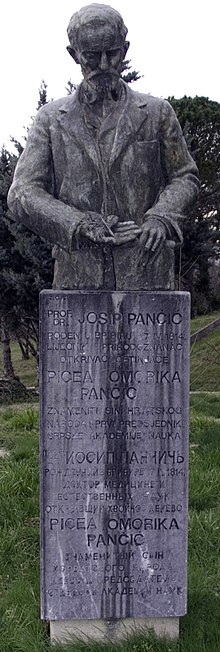
Quick Facts

Biography
Josif Pančić (Serbian Cyrillic: Јосиф Панчић; April 17, 1814 – February 25, 1888) was a Serbian botanist, doctor, a famous lecturer at the Great School in Belgrade and the first president of the Serbian Royal Academy. He extensively documented the flora of Serbia, and is credited with having classified many species of plants which were unknown to the botanical community at that time. Pančić is credited for discovering the Serbian Spruce. He is regarded as the father of Serbian botany.
Life
Early life and studies
Pančić was born in Ugrini, near Crikvenica, at the time part of the Austrian Empire (now Croatia), the fourth son of Pavel Pančić and Margarita. The Pančić family were Bunjevac in origin. According to tradition, the Pančić family hailed from Herzegovina and settled in Ugrini in olden times.
After finishing elementary school in Gospić, he went on to the lyceum in Rijeka, and then continued classes in the Regia Academica Scientiarum in Zagreb (1830). He graduated in 1842 in Budapest in medicine. In addition to other courses, Pančić attended botany courses, taught by the then renowned botany professor, Joseph Sadler (Sadler József). Later, recalling those early lectures, he wrote:
“And since the first course in botany I started to love botany and decided to become a botanist..."
Work




He was acquainted with the Serbian linguist Vuk Stefanović Karadžić in Vienna who wrote him a letter of recommendation to the Serbian authorities in order to fulfill his wish to settle in the Principality of Serbia and to study its nature. In May 1846 he arrived in Serbia, and worked as a physician in rural Serbia. In 1853, he moved from Kragujevac to Belgrade when he was appointed professor of the Belgrade Lyceum (Royal Serbian Lyceum). In 1853, he introduced Mineralogy with geology at the Lyceum.
He extensively documented the flora of Serbia, and is credited with having classified many species of plants which were unknown to the botanical community at that time. His most significant discovery was the Serbian Spruce, which he had discovered near Zaovine on the Tara Mountain in 1875. During the Serbian–Ottoman War (1876–78), he was the Chief Physician of the Belgrade Hospital.
He is said to have "fell in love" with Kopaonik, which he visited 16 times between 1851 and 1886. Pančić was named the first president of the Serbian Royal Academy formed on April 5, 1887. He requested opening of the Botanical garden "Jevremovac" in Belgrade.
Pančić died on February 25, 1888 in Belgrade while working. A mausoleum of Josif Pančić on Kopaonik was erected in 1951 by the Academy, the University of Belgrade and the Hikers union, with the inscription:
Honoring Pančić's request, we moved him here to rest forever. We also announce his message for the Serbian youth: "Only with a thorough understanding and analysis of the nature of our country will they show how much they love and honour their homeland".
Legacy

A research society has been named after him, Josif Pančić Biological Research Society (Biološko istraživačko društvo "Josif Pančić"). He was depicted on the 10 dinara note printed in 1994. He is included in The 100 most prominent Serbs. In 1951 the highest point in the Kopaonik mountain range was changed from Milan Peak to Pančić's Peak.
Awards
- Order of St. Sava
- Takovo Cross
- Cross of the Red Cross
Selected works
- Die Flora der Serpentinberge in Mittel-Serbien (1859)
- Pisces Serbiae (1860)
- Zur Moosflora des nordöstlichen Banates (1861)
- Arena mobilis in Serbia eiusque flora (1863)
- Flora agri Belgradensis methodo analytica digesta – "Flora u okolini Beogradskoj po analitičnom metodu" (1865)
- Šumsko drveće i šiblje u Srbiji (1871)
- Flora Principatus Serbiae – "Flora knez̆evine Srbije ili vaskularne biljke, koje y Srbije divlie rastu" (1874)
- Eine neue conifere in den östlichen Alpen (1876)
- Flora u okolini Beogradskoj po analitičnoj sistemi (1878)
- Elementa ad floram principatus, Bulgariae (1883)
- Nova graca za flora knez︠h︡evine Bugarske (1886)
 Aries
Aries